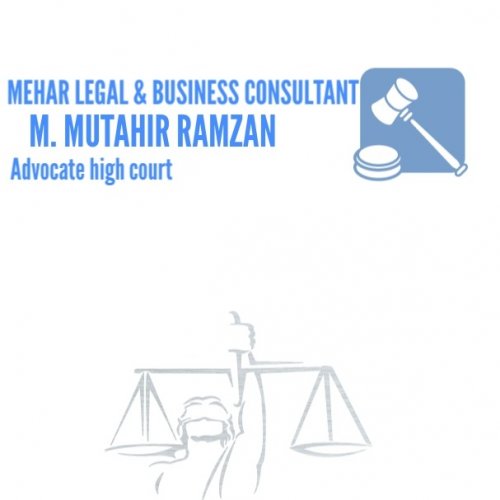Best Bankruptcy Lawyers in Gujranwala
Share your needs with us, get contacted by law firms.
Free. Takes 2 min.
List of the best lawyers in Gujranwala, Pakistan
About Bankruptcy Law in Gujranwala, Pakistan
Bankruptcy law in Gujranwala, Pakistan, falls under the purview of federal legislation applicable nationwide. The primary piece of legislation governing bankruptcy is the Insolvency Law for the individuals and the Companies Ordinance for corporate entities. This law provides a legal structure for restructuring debts and protecting both creditors' and debtors' rights. Bankruptcy proceedings aim to equitably distribute the debtor's assets among creditors and provide the debtor with a fresh start, free of overwhelming financial obligations.
Why You May Need a Lawyer
Several situations may necessitate the assistance of a bankruptcy lawyer in Gujranwala. If you are facing overwhelming debt and are unable to meet repayment obligations, a lawyer can help you explore bankruptcy as a viable solution. Lawyers can provide invaluable assistance in navigating the complexities of filing for bankruptcy, negotiating with creditors, and protecting your rights throughout the process. Additionally, if you're a creditor seeking to recover debts from a bankrupt entity, legal counsel is crucial in ensuring that you adhere to the correct procedures and maximize your recovery.
Local Laws Overview
The local bankruptcy laws in Gujranwala, as part of Pakistan, are influenced by federal legislation which oversees the process for both individuals and corporations. Key aspects include the initiation of bankruptcy proceedings, asset liquidation, and the discharge of debts for individuals. Specific procedures are in place for corporate insolvencies, governed by the Companies Ordinance. Legal practitioners in Gujranwala must therefore be adept at both legal frameworks. Local legal customs and court practices may also influence the outcome of bankruptcy proceedings, necessitating experienced legal counsel familiar with these nuances.
Frequently Asked Questions
What is the procedure to file for bankruptcy in Gujranwala?
The procedure involves filing a petition in the court, submitting detailed financial statements, and attending hearings. Legal advice is crucial to ensure all paperwork is correctly filled and submitted.
Can both individuals and businesses file for bankruptcy in Pakistan?
Yes, both individuals and business entities can file for bankruptcy. The applicable law and procedures differ between personal insolvency and corporate bankruptcy.
How does bankruptcy affect my assets?
Your assets may be liquidated to pay off creditors. However, certain exemptions may protect essential items from being sold.
Will bankruptcy eliminate all my debts?
Bankruptcy can discharge many unsecured debts, but some obligations such as taxes, fines, or certain loans may not be discharged.
How long does a bankruptcy case take to resolve?
The duration can vary depending on the complexity of the case, but on average, it may take several months to a few years to complete the process.
What are the consequences of filing for bankruptcy?
Consequences may include loss of assets, impact on credit rating, and difficulty in obtaining future credit. However, it can also provide debt relief and a fresh financial start.
Can a creditor prevent me from declaring bankruptcy?
Creditors cannot prevent you from filing for bankruptcy, but they can contest it in court. Having a lawyer can help navigate these objections.
What happens to my business if it goes bankrupt?
The business’s assets may be liquidated to satisfy debts, and it may cease operations unless it undergoes restructuring with permission from creditors and the court.
Are there alternatives to declaring bankruptcy?
Yes, alternatives such as debt restructuring, negotiation with creditors, or informal arrangements may be explored to avoid bankruptcy proceedings.
Will I need to attend court hearings if I file for bankruptcy?
Yes, the debtor must attend hearings as part of the bankruptcy process, where they may be required to answer questions about their financial situation.
Additional Resources
Those seeking help with bankruptcy in Gujranwala may contact the local Bar Association for referrals to qualified lawyers. The Securities and Exchange Commission of Pakistan (SECP) and the High Court Tribunal in Lahore may also provide guidelines and procedural assistance. Legal Aid offices may offer support for those who cannot afford legal representation.
Next Steps
If you need legal assistance for bankruptcy in Gujranwala, start by consulting with a lawyer who specializes in insolvency cases. Gather all financial documents and be truthful about your situation to get accurate advice. Attending initial consultations will help clarify your options and guide you in making informed decisions regarding your financial future. Engaging a lawyer can help ensure that your rights are protected and that you achieve the best possible outcome in your bankruptcy proceedings.
Lawzana helps you find the best lawyers and law firms in Gujranwala through a curated and pre-screened list of qualified legal professionals. Our platform offers rankings and detailed profiles of attorneys and law firms, allowing you to compare based on practice areas, including Bankruptcy, experience, and client feedback.
Each profile includes a description of the firm's areas of practice, client reviews, team members and partners, year of establishment, spoken languages, office locations, contact information, social media presence, and any published articles or resources. Most firms on our platform speak English and are experienced in both local and international legal matters.
Get a quote from top-rated law firms in Gujranwala, Pakistan — quickly, securely, and without unnecessary hassle.
Disclaimer:
The information provided on this page is for general informational purposes only and does not constitute legal advice. While we strive to ensure the accuracy and relevance of the content, legal information may change over time, and interpretations of the law can vary. You should always consult with a qualified legal professional for advice specific to your situation.
We disclaim all liability for actions taken or not taken based on the content of this page. If you believe any information is incorrect or outdated, please contact us, and we will review and update it where appropriate.









